Iron Man
 for some intense sequences of sci-fi action and violence, and brief suggestive content.
for some intense sequences of sci-fi action and violence, and brief suggestive content.
Reviewed by: Michael Karounos
CONTRIBUTOR
| Moral Rating: | Better than Average |
| Moviemaking Quality: |
|
| Primary Audience: | Teens Adults |
| Genre: | Sci-Fi Superhero Action Drama Adaptation |
| Length: | 2 hr. 6 min. |
| Year of Release: | 2008 |
| USA Release: |
May 2, 2008 (wide—3800 theaters) DVD: September 30, 2008 |
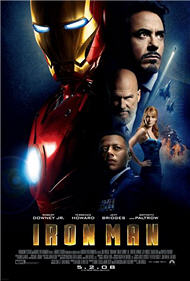
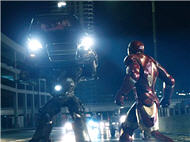
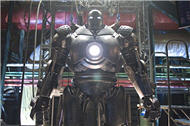
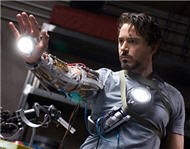

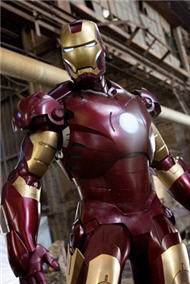


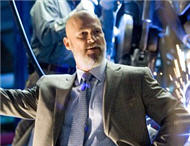

| Featuring |
|---|
| Robert Downey Jr., Terrence Howard, Gwyneth Paltrow, Jeff Bridges, Samuel L. Jackson, Hilary Swank, Leslie Bibb, Clark Gregg, Stan Lee, Shaun Toub, Nazanin Boniadi, Bill Smitrovich, Ghostface Killah, Faran Tahir, Sahar Bibiyan, Sayed Badreya, Fahim Fazli, Micah A. Hauptman |
| Director |
|
Jon Favreau |
| Producer |
| Victoria Alonso, Ari Arad, Peter Billingsley, Louis D'Esposito, Jon Favreau, Kevin Feige, Eric Heffron, Michael A. Helfant, Jeremy Latcham, Stan Lee |
| Distributor |
“Heroes aren’t born, they’re built”
Prequel to “Iron Man” (2008)
The central myth of the movie “Iron Man” is that of a billionaire playboy whose experience as an incarcerated hostage causes him to transform from an economic and social predator into a born-again pacifist. Stark sees the error of his ways, returns home to confront his personal (and business) demons, and spends the rest of the movie trying to do good, home and abroad. In portraying this action, the writers brilliantly mimic the narrative arc of Robert Downey Jr.’s life as his character, Tony Stark, opens the movie with a glass of scotch on the rocks while bouncing along a dirt road in Afghanistan in a humvee.
In short order, Stark is wounded and captured; his life is saved by an imprisoned Afghani doctor; and in one of the more effective metaphors of the movie, the doctor has to remove bits of Stark Industries shrapnel, remnants of the shards of his professional life, that are threatening his heart. The doctor tells Stark that shrapnel victims are called “the walking dead” because of how the shrapnel migrates through the body and belatedly kills them a week later. When Stark questions why he should do anything to prolong his life if he only has a week to live, the doctor responds (paraphrasing), “Well, it’s the most important week of your life. Don’t waste it.”
That is Tony Stark’s born-again moment and it compels him to create a new heart for himself. For Christian viewers, this new-heart metaphor will resonate with Ezekiel 26:36:
“I will give you a new heart and put a new spirit in you; I will remove from you your heart of stone and give you a heart of flesh.”
This is what happens to Stark and from that point he is determined to correct the predatory aspects of his life, whether it concerns conquering financial markets or seducing beautiful women. He shows little concern for his wealth, for his reputation as an industrialist, or for his company’s stock value. He is truly changed and sees the world through an ethical lens that encompasses not just financial and political issues but moral ones as well. We see a biographical montage of how he progresses from a boy genius to a decadent industrialist to the conscience-stricken inventor who desires to create something to benefit mankind. He indeed has acquired a new heart and a new spirit and his life mimics the pattern of creation (boy genius), fall (decadent industrialist), and redemption (conscience-stricken inventor) that is illustrated so frequently in the Bible through the lives of David, Paul, and Peter, and in the parable of the Prodigal Son, to name a few.
As Robert Downey Jr. states in an interview concerning his own personal problems: “You can’t go from a $2,000-a-night suite at La Mirage to a penitentiary and really understand it and come out a liberal.” [reference]
It is an interesting statement from several perspectives, because “Iron Man” is a blend of liberal and conservative trade-offs. There is an indictment of American arms manufacturing—American soldiers are shown being killed with American weapons to illustrate the consequences of American “crimes” overseas, and Tony Stark renounces the military-industrial complex that is in in his own mind. Conservative viewers will be gratified that American soldiers are at least not demonized, that terrorism is a reality, and that Stark undergoes the kind of personal conversion, renouncing sex and drugs, that is characteristic of a conservative ethos which emphasizes personal responsibility. In that regard, the movie brilliantly succeeds in walking the political tight rope of the age and is able to insert a subtle anti-war message where clumsy, anti-war films like “Rendition,” “Lions for Lambs,” “Grace Is Gone,” and “Stop-Loss”—to name only a few of many movies—failed because they were just anti-American propaganda in disguise.
Finally, that which powers Tony Stark, and by extension, “Iron Man,” is the new heart which demonstrates love on a personal level and compassion on a global level. As a metaphor, it is elegant; as a line of reasoning to inform something as complicated as foreign policy, it naturally falls apart. In their effort to offend no one and name no names, the writers describe the Afghani terrorists as “foreigners,” completely ignoring the home-grown Taliban who terrorized the country for decades and who just last week tried to assassinate President Karzai, killing three people. The terrorists are called the “ten rings,” because they come from ten foreign countries, and, in one especially ludicrous moment, one of the terrorists is identified as an Hungarian. Clearly, it is such white Europeans who are to blame for the nameless acts of terror committed in the name of a nameless god which bedevils Afghanistan.
This is not a trivial detail, because, were it not for the American invasion of Afghanistan in a post-9/11 world, Afghanis today would still be living in a medieval world that forbids soccer, kite-flying, music, movies, and, most importantly, education and medical treatment for women. The movie is profoundly dishonest in that regard and exhibits an ideological hangover that blinds people to the enormous good that American military might has accomplished in freeing and keeping free entire nations, including the whole of Europe, South Korea, and Afghanistan from the totalitarian ideologies of Communism, Nazism, and Wahabbism. For a more accurate portrayal of the home-grown terrorism of Afghanistan, see “The Kite Runner” or, better yet, read the book.
In conclusion, “Iron Man” is a triumph of collaborative film making. Although Robert Downey Jr.’s performance has gotten most of the credit for the movie’s success, Jon Favreau’s nearly flawless pacing and the snappy screenplay are responsible for giving Downey a frame in which he doesn’t have to act so much as just be. The perception that Downey’s performance is superb rests more on his comedic timing than it does on his acting chops. This allowed an understated performance to appear nuanced instead of, pardon the pun, mechanical. It is the kind of performance which in the hands of an actor less pitch-perfect (Keanu Reeves) would have resulted in a rotoscoped (“A Scanner Darkly”) performance.
Gwynneth Paltrow as Pepper Potts was sensitive, sweet, and principled, doing as much with her uninspired lines as a charming personality could. Regrettably, Terrence Howard was stiff and Jeff Bridges was unbelievable as a scientist, mad or otherwise. Downey carries the movie, but it is Favreau’s direction that frames him in such a way that even the sequences where Downey says nothing provide visual descriptions of character that are eloquent and convincing.
There is a moment of brief nudity, but there is nothing that should offend even the most sensitive church-goers. While there is no unifying message in the movie as in the recent “Live Free, Die Hard” film which makes a direct appeal to all Americans to band together, “Iron Man” is nonetheless a brilliant success because it appeals to so many different audiences in a time when those audiences are so much at variance with one another.
Violence: Heavy / Profanity: None / Sex/Nudity: Minor
See list of Relevant Issues—questions-and-answers.


Overall, a thoroughly enjoyable movie, overall positive storyline.
Moral rating: Better than Average / Moviemaking quality: 4½
Moral rating: Better than Average / Moviemaking quality: 5
Moral rating: Better than Average / Moviemaking quality: 5
Moral rating: Better than Average / Moviemaking quality: 5
Moral rating: Average / Moviemaking quality: 4
Moral rating: Better than Average / Moviemaking quality: 4½
Moral rating: Better than Average / Moviemaking quality: 5
Moral rating: Better than Average / Moviemaking quality: 3½
Overall, being a big comic book/superhero fan, I thought the movie was well done and very enjoyable.
Moral rating: Better than Average / Moviemaking quality: 4½
Moral rating: Average / Moviemaking quality: 4½
Stark is certainly a playboy at the movie's beginning, but thankfully the two scenes where this is depicted most vividly are about thirty seconds long at most. Once he is captured by terrorists, he begins to be a changed man, and this seems to be reflected in the content of the film.
Again, if you already enjoy this type of film, it's probably worth your time. If (content-wise) you are bothered by any of the other films listed above, you will not feel any differently about this one.
Moral rating: Better than Average / Moviemaking quality: 4½
I think Robert Downey Jr. did an excellent job, and I was surprised he even took the role, due to his ongoing fight with alcohol (I know he has been through a lot with it. And, from what I know from other alcoholics, it IS a daily work in progress).
R.D. Jr.'s character is a “playboy” of sorts, drinks a lot and pretty much has what is called “no social responsibility” of any kind. He lives/parties off of his dead Father's legacy from manufacturing and selling arms. He picks up one young woman, and there is such a brief thing on the bed before they fall off, it is almost not worth mentioning. The next morning, she is walking through his home (“Tony Stark” is elsewhere) in one of his shirts. Nothing else is seen. Gwyneth Paltrow’s character lets the young woman know where her “place” is.
“Tony” gets captured after a demo of one of his weapons, and finds out during his capture the very weapons he has manufactured are ending up in the hands of the enemy. He is forced to make the weapon he demo'd, and instead makes a way for him and his “cellmate” to escape. I won't disclose what happens, except that “Tony” has decided to make a change in his life.
There is only one bad word, and that is when Jeff Bridges character is going after “Tony” and calls him a pr__k. I think something else could have been used.
The graphics/special effects were great and seamless. There were several “belly laughs” while “Tony” is working on his Iron Man suit. And we sure enjoyed how he communicated with his computers (I wonder how long it will be before things are like that).
Being a 55 year old male (I got out of high school in 1972), I remember Black Sabbath's “Iron Man” in 1970, and kind of thought that it should have been used on “Tony's” escape from his captors or when he went back after his captors in his very much improved Iron Man suit. The ending was puzzling (Tony gives out his identity to the world).
Moral rating: Better than Average / Moviemaking quality: 5
I grew up reading marvel comics and wanting to find a hero to believe in. Fortunately, Jesus became my real hero when I was a senior in college. Now, whether Ironman, Batman, or Spiderman, I still love them all as imaginary heroes and greatly enjoyed the fantastic effects that truly made Ironman come to life on the big screen. I do think the PG-13 rating should be a guide to parents as some of the images may disturb children. Enjoy!
Moral rating: Better than Average / Moviemaking quality: 4½
Moral rating: Average / Moviemaking quality: 4
In terms of re-creating the comic book character, they did an excellent job. The original Stark went through the kidnapping experience in Viet Nam—which was the current event at the time of the comic's creation. So basically, the movie modernized the character but remained true to form. Stark's attitude and lifestyle fit the script—a complete contrast to the gentlemanly nature of “Iron Man”—which in the comics made his revelation so unbelievable. The bottom line is fans should be pleased. (There is more, but I don't want to spoil the movie.)
By the way fans, stay around for the scene after the credits. The humor and special effects fit perfectly with the film. My sides were hurting at one point! We left the theater feeling good. All in all, this was one of the best films I have seen in a long time.
Moral rating: Better than Average / Moviemaking quality: 5
Moral rating: Better than Average / Moviemaking quality: 4½
Moral rating: Average / Moviemaking quality: 5
Moral rating: Average / Moviemaking quality: 4½
The acting was quite good for an action movie, and I would even describe it as “An action movie with a heart.” Even the brief sex scene was very brief, not to offend most people. The conversion of Tony Stark was inspiring and positive, and it is something that all genuine Christians can relate to (especially with the backlash of making positive choices). In much the same way, we can find solace in the heroism of the story. True courage doesn't just appear in us, we learn it, it grows within us, and we become stronger because of it. It shows a positive take on a seemingly negative genre. It even had some genuinely funny scenes with the helperbot, and although a few of the scenes and design of the evil Iron Man resembled Robocop 2 far too much, I would highly recommend the movie to believer and comic book fan alike.
Moral rating: Better than Average / Moviemaking quality: 3½
Moral rating: Better than Average / Moviemaking quality: 5
Parents please be aware of this! This review does not mention these scenes at all and I would be highly embarrass if I took my child and they encountered these scenes. Even though I do give this movie great ratings, we have to be care what we put in front of our eyes. There really are better and cleaner ways to portray certain people ESPECIALLY when films like these will draw families to them.
Other than that, the acting and film making and story line were great! The Special Effects AMAZING!! I would recommend seeing this in the theatre but be careful with the kids. Maybe view it first and then base what you see on what to do or at least be aware of where the scenes are.
Moral rating: Average / Moviemaking quality: 5
Moral rating: Average / Moviemaking quality: 4
That said, for an adult the film is not only entertaining but provides an enjoyable (and satisfying) good guy vs. bad guy story. The transformation of Tony Stark from a nihilistic genius to a repentant hero is convincing and heartening. As noted in the main review there is a strong (and unbalanced) anti-war sentiment here, but our soldiers are portrayed as what they truly are, heroes in their own right. Unlike many of today’s films, we get to see evil men, who commit despicable deeds, get their just deserts in a manner that is encouraging in a world where justice seems to be a thing of the past. The obviously selfless motives of the film’s protagonist only serve to make those moments of the triumph of good over evil even more uplifting. (And yes, when unrepentant, irredeemably evil men are stopped from committing atrocities against innocents it is uplifting.)
All in all, one of the best (if not the best) superhero movie to date (and I am a huge fan of superhero movies.) I would only suggest that you not take impressionable children to see it.
Moral rating: Better than Average / Moviemaking quality: 5
The significant aspect of the change in my view is that he started to care more about the ramifications of his actions and therefore concerned in making his life make a difference instead of selling weapons and don't care. The worst word I heard was SOB, other than that I could not remember anything else. I was very satisfied with this movie and highly recommend it to all ages although from a technical point of view, the ending could've had more punch to it to make a stronger finishing statement. But then again, there's always part 2.
Moral rating: Excellent! / Moviemaking quality: 4½
I was pleased to see it quickly take a change and be full of action and amazing special effects. It was quite captivating and we were entertained by the film and it's impressive hero.
Most likely there will be a sequel to this one. If there is a next one I will view it first to decide whether or not it is appropriate for children or if we indeed need to skip the first 20-30 minutes of it! If the movie had continued on the way it was headed I would have walked out. Come on Hollywood—it's time to take the trash out. A good movie like a good restaurant shouldn't start with a bad smell to it.
Moral rating: Average / Moviemaking quality: 5
Moral rating: Average / Moviemaking quality: 5
Moral rating: Better than Average / Moviemaking quality: 5
I agree with the review that “Iron Man” walks the tight rope between pro-war and anti-war with aplomb. I believe the war in Afghanistan is a biblically just war and America ought to be there. However, as a Christian I earnestly pray for the end of hostilities both there and in Iraq and in that sense I am not pro-war. Sometimes, I wonder if we, American Christians, are not a little too quick to support war for the sake of war now days. Ps 120:7
The reviewer criticized the movie for not naming the Taliban but naming the militants the “Ten Rings.” However, the “Ten Rings” is pulled right out of the pages of the original comic book. Remembering that we are in a comic book movie, the producers are staying true to the source material and setting us up for sequels rather than denying the reality of the Taliban, IMO. The original comic book origin was set in Vietnam which would make no sense in 2008 and I’m proud of Marvel for setting the movie origin right in the middle of an actual war between America and Islamofacist militants.
I also agree with the reviewer that Downey truly carries the movie as Stark. Downey has permanently stamped his image on the role and is the measure by which any other actor in that role will/would be compared. And anyone who is familiar with Downey’s private life can only wonder if he didn’t bring a good bit of his personal experience to his character. I thought Paltrow did a great job as Pepper Pots and the chemistry between her and Downey was just right. Unlike the reviewer, I totally bought into Jeff Bridges “Judas” role in the film. He was completely convincing as a good guy and completely menacing as the bad guy. To me, Bridges really demonstrated his acting range.
Of all the movies that have come out so far this year, I recommend this one (with qualifiers noted above) above all the others. And as comic book adaptations go, this is one of the best ever.
Moral rating: Better than Average / Moviemaking quality: 5
Aside from those things, which I feel are so minor I wouldn't even factor them into the film's score, there is one blasphemy in the movie and two short suggestive scenes. If you avoid the content I am about to tell you you should not object to the film at all, at least I didn't.
What I am about to tell you is an incredibly, incredibly small spoiler. This spoiler is so small that it does not change the movie at all, it simply lets you as a viewer know where the inappropriate content is. Near the beginning of the movie, there will be a blonde headed woman who asks Tony Stark (the main character) some questions (she is a journalist/reporter/something similar) as he is about to get in his car. It then jumps to a bed where sex is implied. She has a shirt on, but only a pair of underwear. This lasts for 15-20 seconds, then she wakes up the next morning by herself. She is walking around with only a long sleeve shirt on, but it goes down to right above mid thigh. When she walks up the a console of the door and tries to interact with it, it speaks to her and she misuses the name of Jesus to show she was surprised.
A little bit later, when Stark and his military friend are on the plane, Stark tries to his friend to drink. He says he is working so he can't, but he does and then it skips ahead a few hours and they are impaired. Then for I guess 1-2 minutes they are talking while there are women dancing on a pole in the plane. However, they are fully clothed.
Now that you know these sections of the movie and roughly what time they happen I would heartily recommend seeing “Iron Man”. Just make sure to plug your hears or close your eyes for these for these short parts. If you don't want to take a chance of hearing it or seeing it at all, you could just step outside the theater for a few seconds during those parts.
Moral rating: Offensive / Moviemaking quality: 4½
Moral rating: Good / Moviemaking quality: 5
Both of us were glad we went to see it. Yes, Tony Stark was a womanizer who could care less about his life's direction; he was a sinner like us all. Now, being a comic-book film, I didn't expect anything related to salvation through Jesus, but it was, as Plugged In said, the closest thing to Saul's encounter on the road as it could be. Tony realizes that his life is empty and decides to change his ways. He at first could care less that innocents were being killed by the very weapons he made to protect them. He realized his company was crossing a line, and he could no longer turn a blind eye to it. Not a spiritual transformation, but one that be used as a springboard into one.
Whereas Obidiah Stane only cared that the company, and thus himself, made money (that's what I got out of him) His greed and desire for power led to his demise.
And for those who say that this movie is liberal propaganda, I say this. You can interpret it that way, but I think Tony Stark did what he did (ending his weapons manufacture) because his weapons were being dealt into the wrong hands. He had to do something to stop it. To me, it wasn't an anti-war message, but rather an anti-corruption message. Don't you think there are people like Stane who sell weapons to the wrong people? It only takes one bad apple. Tony saw that one bad apple had become a large weed, and he had to cut it off at its root.
Moral rating: Better than Average / Moviemaking quality: 4½
Moral rating: Average / Moviemaking quality: 4
All I really have to say about those scenes is that you just need to get over it. It's the world we live in, the man portrayed in the film is a billionaire playboy, what did you expect? The “sex” scene itself is incredibly short, no nudity, and I barely noticed it. The film itself is about one man's quest to live his life for a greater purpose than just himself. (spoiler alert) upon being captured by terrorists, weapon developer Tony Stark is forced to create a Jericho-class Missile (Stark Industry's newest weapon sensation) for the terrorists to use. Stark is led through the camp and notices that almost all of the weapons the terrorists have were manufactured by his company. Stark is appalled by this, and after telling the Terrorist that he will build the missile, they give him all the parts necessary to do so, but instead of crafting the missile, Stark crafts a suit of robotic armor and uses it to escape. After his rescue and return to the United States, Tony Stark has a change of heart and decides to do everything possible to get his weapons out of the wrong hands and ends all weapons production at his company, causing his stocks to plummet. Stark then creates a much more advanced suit of robotic armor and uses it to destroy his weapons sold under the table to terrorists, and stop a madman from selling his plans for the robotic “Iron Man” suit to governments worldwide.
(spoiler done)
Much of the movie is about the reckless Tony Stark's change of heart and search for redemption when he learns of his company's less than moral dealings. Though Stark remains cocky throughout the film, his character is endearing and shows that he cares for people other than himself.
Moral rating: Better than Average / Moviemaking quality: 4
This film, yes, apart from the girls and the cussing (which I was none too pleased with and thankfully forgettable), had such excellent biblical allegory! Stan Lee's Marvel Superheroes are very much a parallel of the Christian experience unlike DC Superheroes that are usually more vengeful and less humble (Must I remind you of the blasphemous “Batman Begins” and “You swear to me!!” remark?).
“Iron Man” surely delivered; I cried the first time I saw it after reading the review here at ChristianAnswers.net. I was so very moved by the radical change of heart but the personality was still there. My pastor taught me that God changes our hearts but He lets us have our personality still. Think about it: Paul wrote different than Luke; Jonah served a LOT differently than Isaiah, and so on.
It was cool to see Tony Stark's “new heart” and I hope this film could be used to make the message of redemption plain. I really mean that. If jumbled, I apologize, I just finished watching the DVD (did I mention that already?).
Moral rating: Better than Average / Moviemaking quality: 5
There was some objectional content in the beginning. We ended up skipping a scene that has been mentioned by others. The swearing was not a factor because my family has a TV Guardian that eliminates all swear words. I was suprised though by how little it was used.
Overall, an excellent movie. I hope they make a second one, my expectations will definitely be higher than they were for this film. As a Christian, I give this film a thumbs up.
Moral rating: Better than Average / Moviemaking quality: 5
Moral rating: Offensive / Moviemaking quality: 4
Moral rating: Average / Moviemaking quality: 5
This movie has great special effects but is not for young children. Had I known what I now know, my 8 and 10 year old children would NOT have seen the film. By the way, in my opinion, the film is a bit anti-American, with a typical Hollywood liberal slant on the realities of world politics.
Moral rating: Offensive / Moviemaking quality: 4
Moral rating: Average / Moviemaking quality: 2
The hero seems never to be quiet. At times just rumbling on as if he just likes to hear himself talk. He frequently drinks and acts child like as an adult. Sexual escapades are implied and acted out. For example, He is being interviewed by an attractive lady one moment and the next they are in bed. (It was vulgar.) Another time at a “party” a girl calls out to him. “Hello, do you remember me?” His reply was a casual “No!” You would be brain dead with his life style portrayed throughout the film not to pick up on the past relationship between the two.
There are many examples of where and how this film misses the mark. I will not go in to them. I warn you though this is not a family friendly film!
Moral rating: Offensive / Moviemaking quality: 4
Moral rating: Offensive / Moviemaking quality: 5
The movie makes heroes of the military, but is slightly critical in the role Big Business plays in providing weapons to the good guys, and to the bad. There is a humurous reference to the amount of anti-terrorist organizations the US has. Which include SHIELD in the movie.
As far as objectional content, there is a brief sex scene where you see the woman's back. No erotism is shown. The language is light. It was mostly the violence that some may find objectional. Big explosions, gunshots, and what not, but no graphic body parts flying all over the place.
The way the movie was made was incredible. The Iron Man suit looked real as it soared through the air. The final battle between Iron Man and the Iron Monger was so believable that I actually wanted to cheer, but restrained myself.
Go see it and enjoy yourself.
Moral rating: Average / Moviemaking quality: 4
Moral rating: Offensive / Moviemaking quality: 3½
Moral rating: Very Offensive / Moviemaking quality: 3½
You guys normally do a great job in reviewing movies and it means a great deal to me and my family.
Moral rating: Very Offensive / Moviemaking quality: 4
Moral rating: Offensive / Moviemaking quality: 4
Moral rating: Very Offensive / Moviemaking quality: 1
Moral rating: Better than Average / Moviemaking quality: 4
Moral rating: Better than Average / Moviemaking quality: 5
Moral rating: Good / Moviemaking quality: 5
The storyline was one to be applauded. It contained lots of room for the non-existent action. There was a lot of surprising plot twists in the story which added some amount of life to the presently boring film. Robert Downey Jr. definitely carried the acting. He fit his character perfectly, with sarcastic humor and endless charm. The score was unusual, but it fit the movie.
Save for The Dark Knight, this is the most violent superhero movie I've seen. Not only are there the typical explosions and shootings, but the whole idea of Tony having to live with a weird contraption in his chest is pretty sick. In one scene, he decides to switch out the gadget for a replacement. His assistant, Pepper Pots helps him by pulling it out. It doesn't help to have Pepper describing it all in disgust (this spreads to the audience). Some humor is thrown in to relieve the pain, and we recover soon. The same thing happens later, when Obadiah steals it from his chest. As he yanks it out, we hear a sickening sound that makes us start to hurt right along with Tony. Also, near the beginning, Tony is water boarded by the infamous group of terrorists, and his French helper nearly has a coal put into his mouth by their leader.
Unfortunately, there is also some sexually suggestive material. I had heard that there was a scene in the beginning where Tony beds a reporter, but I wasn't expecting the scene I got. You see the clothed reporter crouching over a clothed Tony as the two kiss passionately, and loudly. The scene lasted for several seconds, and I, felt rather uncomfortable. The next scene shows the reporter waking up naked, a sheet barely covering her chest and privates. Later, we see Tony in a private jet, drinking from a bottle while three flight attendants dance seductively for him. In a later, and much milder, scene, Tony dances with Pepper, who is wearing a backless dress. Other than that, the film is pretty clean, with only a couple profanities.
I can't say I disliked “Iron Man,” and I wouldn't mind seeing it again. But on the other hand, I really can't say I like it either. It certainly had no excuse for being sub-par, in more areas than action. I decided not to forgive it.
Moral rating: Average / Moviemaking quality: 3½
Moral rating: Very Offensive / Moviemaking quality: 4
The beginning of the film has some suggestive conversations and scenes, some language and taking the Lord's name in vain, drinking or scenes of the same nature, and even a few torture scenes. It doesn't dwell on any of these particularly long, but there's enough of this questionable movie-making at the start that many are offended and walk out. If you can either ignore, stomach, or walk out for popcorn at the starting fifteen minutes or so, you would probably be better off. I might point out, however, that some of the important information for the storyline is given at the start, so try to get that if you can.
“Iron Man” in many ways shows how sinful man is and how we need a change of heart. That's exactly what happens in this movie. Tony Stark (the lead character, played by Robert Downey Jr.) is living a sinful life, very worldly, very self-centered; that is, before a life-changing event happens, in which his nature changes, and he is a new creature, so to speak. The rest of the movie he is an admirable character and fights for what is right. So as not to spoil anything, I'll just say that it's a very good illustration of salvation.
A similar movie to “Iron Man” was the recent Transformers, in which there was too much suggestive material and it wasn't nearly as serious or as outstanding of an action movie. Hancock (another recent superhero film) came shortly after “Iron Man”'s release and it also struggled in maintaining overall wholesome content or quality. Despite objectionable content (mostly near the start), “Iron Man” had excellent special effects, thrilling action-packed scenes, superb acting, and was a very well made movie overall. If you're looking for a good superhero movie, I'd recommend this one.
Moral rating: Better than Average / Moviemaking quality: 4½
Moral rating: Better than Average / Moviemaking quality: 5
I saw another comment that said that the woman and her husband walked out of the theater because they thought that there was nothing that could have redeemed tonys poor behavior, I beg to differ. sure, he didnt become a christian, but if he had he would hav been totally forgiven… idk if that makes sense…
but all in all, I found this movie much better then the other nasty stuff being thrown at us these days.
Moral rating: Better than Average / Moviemaking quality: 4½
When I heard that this movie was one of Marvels newest and best super hero movie this was a must see.
The movie was great! Not to much cursing and there was really no Sexually explicit scenes. There was a clear line between good and evil and there was nothing really bad about this movie.
I know some people say not to see this movie because of its violence and cursing but from what I saw there was nothing wrong with this movie.
Usually for me the cursing goes in one ear and out the other, plus the world curses so much more then the people who cursed in this movie.
If you are trying to avoid cursing period then I advise locking yourself in a room and have nothing to do with civilization as we know it, we are a fallen world, its a sad fact.
I think that this movie is okay for Christians, as long as you can handle the MINOR cursing.
Now, if you are looking for a great super hero movie with a few curse words and some sick action scenes this is the one to see.
Moral rating: Good / Moviemaking quality: 5
There was a certain amount of objectionable content, but other than language, the only thing I found particularly objectionable is the scene with the reporter and the dancing scene aboard Stark's plane. While this may have been put into the movie to show what Tony Stark left behind, if you fast-forward the movie from Stark's brief conversation with the reporter all the way to the scene where his plane lands in Afghanistan, all the objectionable content will be past. I've heard that DVDGuardian can blocklanguage on DVDs, so that problem can probably be fixed.
I like the fact that after Tony Stark got a “new heart,” he started trying to help others rather than himself, and to leave behind the immoral lifestyle he had led before. Perhaps my favorite parts in the movie were the scenes where Iron Man was “fighting” (if you can call his utter defeat of them fighting) the terrorists and showing off the capabilities of his suit, and the final scene in the movie where Tony Stark doesn't “stick to the cards.” Nice car aficionados like myself will like the cars in Tony Stark's garage and him driving his Audi R8, and they may also cringe at the destruction of his Shelby Cobra.
Overall, I think it was a pretty good, enjoyable movie with a good ending, and unlike many other mainstream films that are saturated with objectionable content, “Iron Man” has only a few such scenes. However, because those scenes are all right after each other, you can fast-forward through them without having missed anything you'd have wanted to see (with the possible exception of a brief scene with Stark driving his R8 to the plane and the S.H.I.E.L.D. agent in a Rolls Royce, or a conversation between Pepper and the reporter, which is probably best avoided because of the reporter's lack of enough clothing). With all that being said, I would recommend this to action movie fans and even those who simply like movies with good themes.
Moral rating: Better than Average / Moviemaking quality: 5
Moral rating: Better than Average / Moviemaking quality: 4
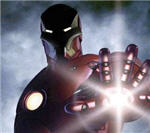
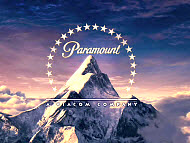
My Ratings: Moral rating: Better than Average / Moviemaking quality: 5